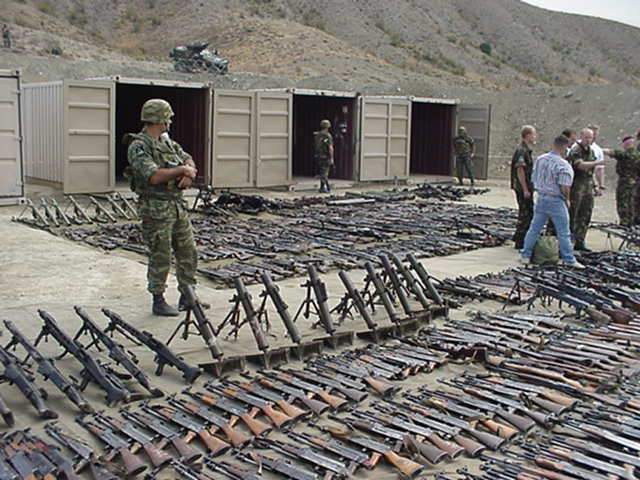Peace support operations in North Macedonia (2001-2003)
In 2001, NATO engaged in three separate operations on the request of one of its former partner countries – North Macedonia (previously known as the former Yugoslav Republic of Macedonia). These operations helped to quell tension between the country’s ethnic Albanian minority and national security forces.

- With the signing of the Ohrid Framework Agreement (13 August 2001), the Skopje government pledged to improve the rights of its ethnic Albanian population and the latter agreed to abandon separatist demands and hand over weapons to a NATO force. This was the beginning of NATO’s short-term military presence in the country (2001-2003).
- Operation Essential Harvest (22 August – 26 September 2001) helped to disarm ethnic Albanian extremists on a voluntary basis.
- Operation Amber Fox (27 September 2001 – 15 December 2002) was mandated to ensure the protection of international monitors from the European Union and the Organization for Security and Co-operation in Europe, which oversaw the implementation of the Ohrid Agreement.
- Operation Allied Harmony (16 December 2002 – 31 March 2003) provided continued support for the international monitors and assisted the government in taking ownership of security throughout the country.
- NATO maintained a military headquarters in Skopje to provide support in security sector reform until 2012, when the headquarters became the NATO Liaison Office Skopje.
- North Macedonia had been a NATO partner country since 1995 and, after a mutually acceptable solution to the issue of its name was reached with Greece, it became a NATO member in March 2020.
- The country has been recognised as the Republic of North Macedonia since 15 February 2019.
-
Three separate NATO operations
Setting the scene
Violence broke out in the country when ethnic Albanian extremists challenged government authorities to grant the ethnic Albanian community more rights. On 20 June 2001, President Boris Trajkovski sent a letter to Lord Robertson, the then NATO Secretary General, to request NATO assistance in keeping civil war at bay. He wanted NATO to assist his government in demilitarizing the National Liberation Army (NLA) and disarming ethnic Albanian extremists operating across the country. Diplomatic efforts and peace talks had been initiated but stalled over a series of delicate issues, including the question of whether Albanian would be recognised as an official language.
NATO adopted a dual-track approach: it condemned the attacks but urged the government to adopt constitutional reforms to increase participation of ethnic Albanians in society and politics. NATO approved the operation on 29 June, but its conditions for deployment were that the political dialogue between the various parties in the country had a “successful outcome” and a cease-fire was respected. Only then would NATO send troops with “strong rules of engagement” to collect weapons from the ethnic Albanian extremists.
On 15 August, two days after the signature of the political framework agreement – the Ohrid Framework Agreement – the North Atlantic Council authorised the immediate deployment of the Headquarters of Task Force Harvest on the ground. This was the first of three operations to be launched:
- Operation Essential Harvest;
- Operation Amber Fox; and
- Operation Allied Harmony.
Collecting weapons
NATO officially launched Operation Essential Harvest on 22 August and effectively started operations on 27 August.
The 30-day mission aimed to disarm ethnic Albanian insurgents on a voluntary basis. Approximately 3,500 NATO troops, with logistical support, were sent to the country. Nearly 4,000 weapons and several hundred thousand more items, including mines and explosives, were collected. The operation finished on 26 September 2001.
Protecting international monitors
Following the conclusion of Operation Essential Harvest, the Allies launched Operation Amber Fox. The Operational Plan was approved on 26 September 2001 and the mission officially started the next day.
Operation Amber Fox was mandated to assist in the protection of international monitors from the European Union and the Organization for Security and Co-operation in Europe, which oversaw implementation of the Ohrid Agreement.
The mission was deployed under German leadership with the participation of other NATO member countries, and consisted of 700 Allied troops joining 300 troops already based in the country. Initially, Operation Amber Fox had a three-month mandate, but it was subsequently extended until 15 December 2002.
Minimising the risks of destabilisation
In response to an additional request from President Trajkovski, the North Atlantic Council agreed to continue supporting the former Yugoslav Republic of Macedonia, as it was known then, with a new mission that would help minimise the risks of destabilisation.
While acknowledging that Operation Amber Fox could be finalised, the Council agreed that there was a requirement for a follow-on international military presence in the country.
Operation Allied Harmony was launched on 16 December 2002 and its objectives were to provide continued support for international monitors and to assist the government in taking ownership of security throughout the country.
On 17 March 2003, the North Atlantic Council decided to terminate Operation Allied Harmony as of 31 March, and to hand over responsibility for a continued international military presence to the European Union.
-
NATO HQ Skopje and the NATO Liaison Office Skopje
NATO Headquarters (HQ) Skopje was created in April 2002 to advise on military aspects of security sector reform. NATO HQ Skopje maintained regular contact with government leadership and other agencies (principally defence and military authorities), as well as with the missions of the European Union, the Organization for Security and Co-operation in Europe and the United States, as guarantors of the Ohrid Framework Agreement.
In 2012, the Headquarters was downsized and became the NATO Liaison Office (NLO) Skopje. The NLO assisted with security sector reform in North Macedonia and host nation support to the Kosovo Force (KFOR); it also advised on military and technical issues. When North Macedonia became a NATO member in March 2020, the NLO shifted its focus to supporting defence reforms and the country’s full integration into the Alliance before its formal closure at the end of March 2021.
